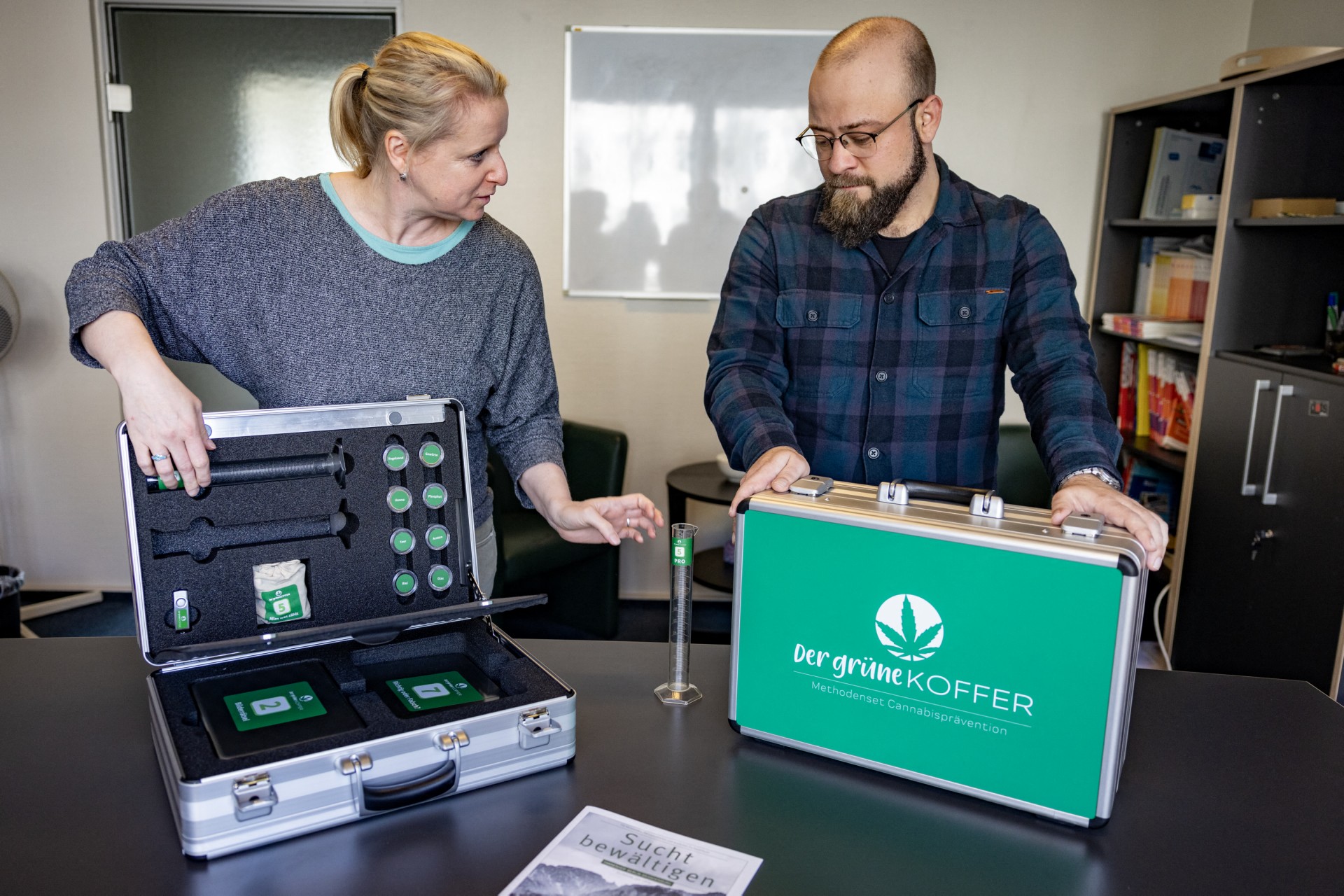
Ever wondered what made people tick? That’s exactly what a psychology degree is all about.
Whether it’s exploring how we form relationships or understanding cultural differences in behaviour, studying psychology helps you see people through an entirely new lens.
It’s fascinating — and increasingly practical too. A psychology degree gives you skills that can help you in almost any career.
Think about it: understanding people is at the heart of everything, from managing a team to supporting friends and family.
That’s why psychology graduates end up in various fields, from therapy and teaching to business and even tech.
While this degree is versatile today, that doesn’t mean it’s a guaranteed path to success.
Like every other job, it’s important that you have the right degree, experience, and connections.

A psychology degree can prepare you for many roles, including as an addiction therapist. In this photo, Katja Seidel (L) and colleague Pascal Noack (R) demonstrate “The Green Case” during an interview with AFP in Berlin, on March 27, 2024, a suitcase containing a kit used to communicate with students during a cannabis prevention visit to schools in Berlin and Brandenburg. Source: AFP
The importance of choosing the best countries to study psychology
Where you choose to earn a psychology degree matters.
The best countries to study psychology offer innovative research opportunities, strong support for studying STEM (that’s Science, Technology, Engineering and Mathematics), and a society open to the power of psychology.
A country where research is robust means their universities likely have access to the latest developments in the field. Your professors are likely to be active participants in this scientific community and can then impart up-to-date discussions in their classes with you.
As statistics — and the other sciences — is a big part of a psychology degree, it’s crucial that you choose countries well-known for supporting STEM education. You’re likelier to find support and resources when you’re stuck trying to complete assignments on math and tedious data analysis and entry.
What goes on beyond campus grounds is another key consideration. If you’re in a country where psychology is widely dismissed as a “useless degree” to treat “crazy people,” you’ll likely be in a space where there’s little funding to fund research and policies related to this field — in short, not the kind of intellectual culture that’ll be helpful to your psychology degree.
Students who have taken psychology courses tend to have stronger scientific literacy – meaning they are more likely to understand concepts that apply to all scientific disciplines – than those who haven’t, explains APA member Salvador Macias III, PhD: https://t.co/zaU7JqSQSA pic.twitter.com/gl6Q8DjvHC
— American Psychological Association (@APA) September 12, 2019
5 best countries to study psychology beyond the UK, US, Australia, and Canada
Check any rankings of the best universities to study psychology, and you’ll likely see these countries featured regularly: the US, UK, Australia, and Canada.
There is no doubt that their universities deserve their top rankings — but that doesn’t mean that these are the only countries that provide great degrees in psychology.
There are alternatives that are nearer, more affordable, and with easier application processes — with no compromise on quality.

For a high-quality, low-cost psychology education, Germany is a great choice. Just remember that you need to learn German first. Source: AFP
Germany
Germany has long been at the forefront of psychology, with its rich history of groundbreaking research and influential thinkers.
Wilhelm Maximilian Wundt, often hailed as the “father of experimental psychology,” made history by founding the first psychology laboratory at the University of Leipzig in 1879.
Wundt’s vision and dedication drew curious minds from around the world, eager to witness his pioneering work and learn from his groundbreaking insights into human behaviour.
Today, Germany continues to be one of the best countries to study psychology, with the University of Leipzig standing as a testament to its historical and ongoing impact on the field.

Look beyond the usual tourist hotspots of the Netherlands, and you’ll find some of the most active departments of psychology in the world. Source: AFP
Netherlands
When it comes to the best countries to study psychology, the Netherlands is a standout destination.
The country has a long-standing tradition of innovation in psychology, dating back to Gerard Heymans, one of the first psychologists to develop a personality theory based on temperament.
But what makes studying psychology in the Netherlands so special? The short answer is it’s the interdisciplinary approach that merges innovation, scientific precision, and real-world relevance.
The University of Amsterdam is a top choice for aspiring psychologists, offering leading research in Brain and Cognition, Clinical Psychology, and Work and Organisational Psychology.
Plus, with diverse bachelor’s and master’s programmes, the university ensures students can tackle the most pressing challenges in psychology today.

Italy’s rich cultural environment provides a unique opportunity to expand your social and cross-cultural psychology knowledge. Source: AFP
Italy
Whether you’re interested in clinical practice, cognitive science, or developmental psychology, Italy has a lot to offer.
It’s one of the best countries to study psychology, thanks to its rich history, innovative research, and welcoming academic environment.
Eugenio Tanzi, a significant figure in Italian psychology, is known for his work in neurology, which explored nervous and mental diseases.
His work helped pave the way for Italy to adopt psychoanalysis and apply it in clinical practice.
Today, top universities like Sapienza University of Rome and the University of Milan continue to lead the way.
They offer comprehensive psychology programmes with a focus on clinical practice, cognitive psychology, and neuropsychology, making Italy a distinguished choice for academic advancement in psychology.

Singapore is home to an Urban Psychology Lab, which focuses on the intersections of mobility, health and sustainability in cities. Source: AFP
Singapore
The Southeast Asian country of Singapore is no more than the size of a dot on the world map, yet it’s one of Asia’s most advanced and educated — if not the most.
As a psychology student, you benefit from the melting pot of Chinese, Malay, and Indian cultures as a way of understanding people from different backgrounds with depth. You’re diversifying your point of view through non-Eurocentric living and learning.
Psychological innovation and research come in abundance here. They’ve built online tools such as “Let’s Talk” to strengthen access for youths to mental health resources and professionals. The Lee Kuan Yew Centre for Innovative Cities hosts the Urban Psychology Lab, which uses psychology and scientific research to address “behavioural phenomena” in cities.
There are several universities that have made Singapore one of the best countries to study psychology, with the most recognisable of those being the National University of Singapore (NUS) and the Nanyang Technological University (NTU).

Chile’s roots in psychology is over a century old. Source: AFP
Chile
In Chile, the roots of psychological pedagogy started in 1885 with the hiring of two German educational psychologists, Wilhelm Mann and Heinrich Schneider — Mann being the founder of the first experimental psychology laboratory in Chile.
Since then, Chile has grown exponentially in terms of its reputation in psychology. They went from having 86 students in 1980 to 3,593 students in 2000. Most of the graduates dive into work as clinical, occupational, and educational psychologists.
Institutions like the Pontifical Catholic University of Chile and the University of Chile are some of the most renowned places to attain a formal education in psychology. Experiential learning and innovative research are conducted, where students grow global perspectives through the application of real social issues in Chile.










